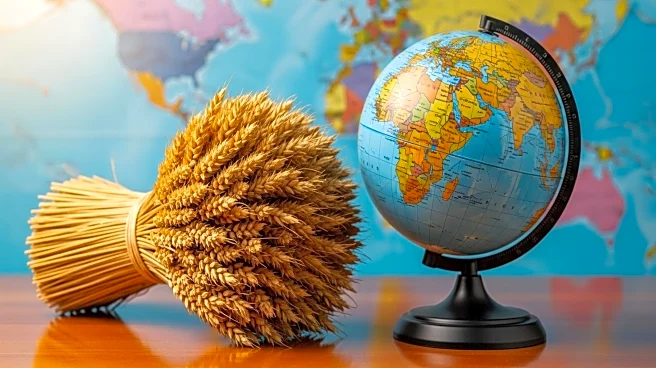What's Happening?
Eleven global associations from the agricultural and agri-food sector have publicly expressed their support for the World Trade Organization's (WTO) multilateral trading system. This collective action was marked by the co-signing of an open letter, coinciding with the WTO's annual Public Forum in Geneva. Led by CropLife International, the associations emphasized the WTO's critical role in maintaining a trading system that is essential for global food security. The signatories, representing over 10,000 private sector companies worldwide, highlighted the importance of the WTO's science- and rules-based principles in fostering innovation, preventing trade barriers, and ensuring equitable agricultural trade. Emily Rees, President and CEO of CropLife International, presented the letter to WTO Director-General Dr. Ngozi Okonjo-Iweala, underscoring the need for global cooperation and innovation to maintain food flow and support economies.
Why It's Important?
The support from these agricultural associations underscores the significance of the WTO's multilateral trading system in addressing global food security challenges. By advocating for open and rules-based trade, the associations aim to prevent geopolitical fragmentation that could destabilize food supply chains. This initiative highlights the reliance of smallholder farmers and developing countries on a predictable trade framework to access markets and technologies. The collective backing of the WTO's principles suggests a commitment to sustaining agricultural trade that is inclusive and equitable, which is crucial for the livelihoods of millions worldwide. The associations' readiness to contribute to a robust trading system reflects the broader industry consensus on the need for stability and cooperation in global agriculture.
What's Next?
The associations have expressed their willingness to engage and align with the WTO's mission, particularly as they prepare for the 14th Ministerial Conference in Cameroon next March. This event will be pivotal in shaping future agricultural trade policies and ensuring successful outcomes that support global food security. The ongoing collaboration between these associations and the WTO is expected to foster innovation and strengthen the multilateral trading system. Stakeholders in the agricultural sector may anticipate further strategic discussions and initiatives aimed at enhancing trade frameworks and addressing food security challenges.










